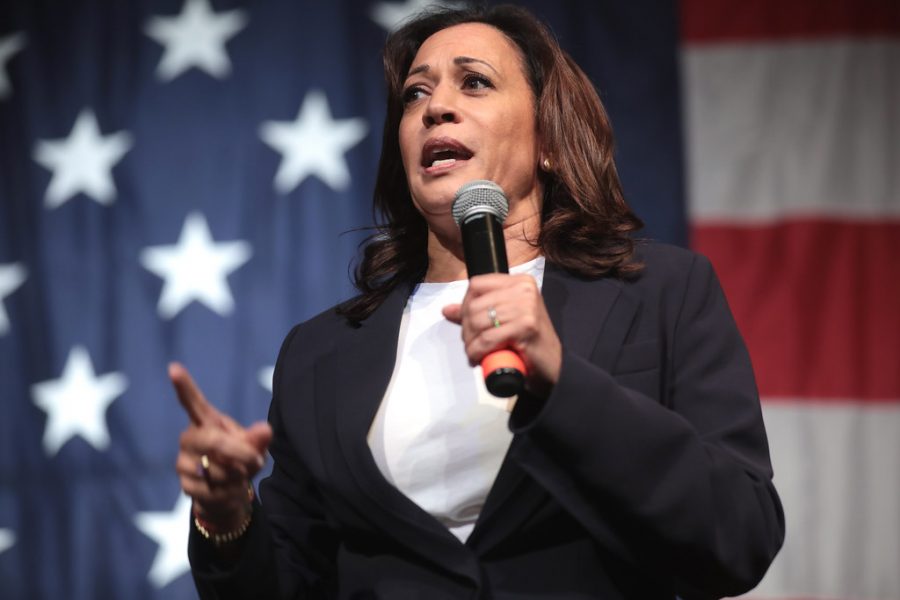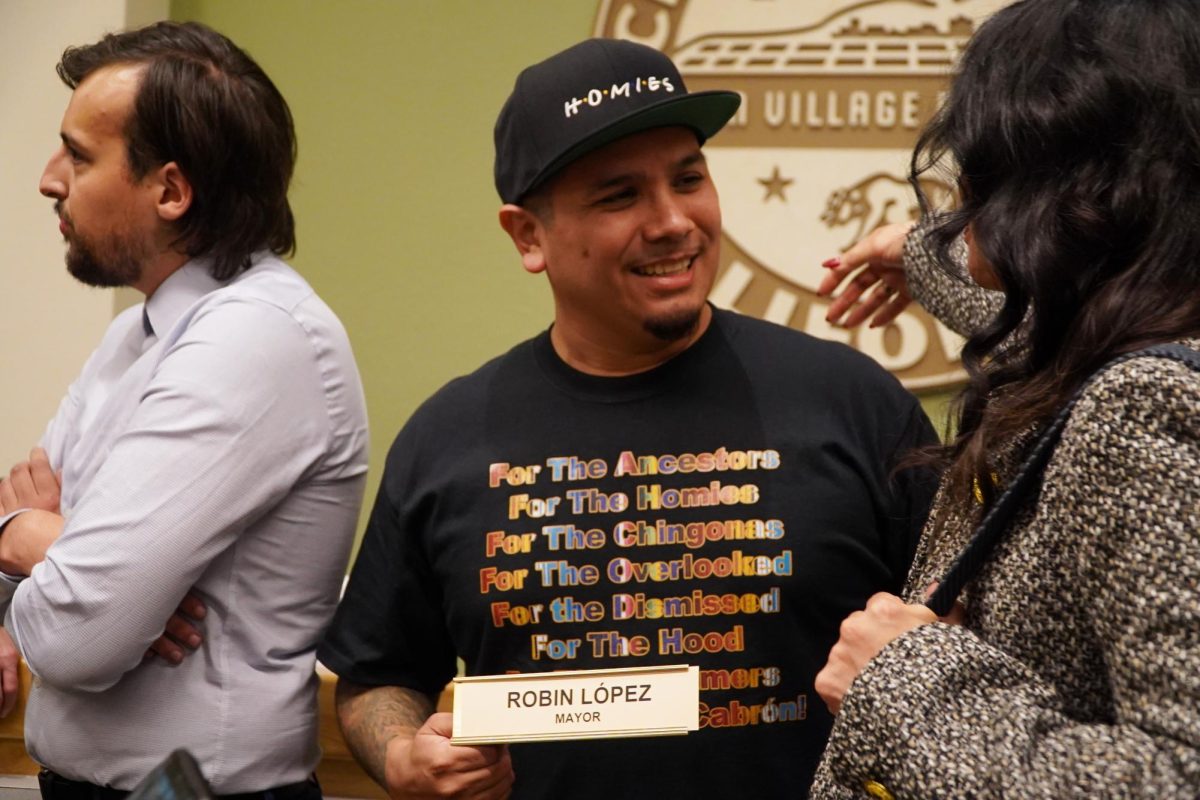Speculation on whom Joe Biden will choose as his vice president has been under public scrutiny as the presidential election enters its final hurdle. Biden, the Democratic Party’s presumptive nominee, is announcing his choice for a running mate next week.
Sen. Kamala Harris, former district attorney for San Francisco and attorney general for the state, is a possible candidate for Biden’s choice. However, the rising notion of defunding the police poses a threat to Harris’ potential. Outside of the Republican party, which has repeatedly condemned the heightened social unrest, members of the Democratic Party – Harris included – have been under fire from protestors affiliated with Black Lives Matter (BLM). With issues of systemic racism and police brutality highlighted within protests across the U.S., Harris faces pressure from within the party because of her record, which focused heavily on harsh approaches to crime.
Ron Hayduk, a political science professor at SF State, said that these demonstrations will be a “focal point” in the upcoming elections and will definitely add pressure on political candidates.
“There’s a lot at stake. Kamala Harris could elevate or amplify some of the movements,” Hayduk said. “She helped craft recently, something called the Justice and Policing Act, which … sort of is an attempt to, on her part, help her look like a police reformer by democrats in the House [and] in the Senate. But you know, her record as a prosecutor, kind of … cuts either way, especially in African-American communities, and especially among Black Lives Matter folks.”
Democratic House and Senate members introduced the George Floyd Justice in Policing Act on July 8 in efforts to reform law enforcement and administer police accountability. Harris is a co-sponsor and one of about 200 members of Congress who support the reform act. Members of both chambers kneeled before introducing the bill on Capitol Hill.
In a press release that introduced the policing act, Harris brought up her time as a state prosecutor and attorney. “I know that real public safety requires community trust and police accountability,” Harris stated. “I am proud to join my colleagues in introducing this historic legislation that will get our country on a path forward.”
Luke Heslip, political science major at SF State and former aide to the national program director for Beyond Differences, commented on how “crucial” this time is for social justice groups within the U.S. and the burgeoning sense that injustices are being discussed at a mainstream level.
“When Sen. Harris [ran as] a presidential candidate, she ran on an exceedingly progressive criminal justice platform and I think aligns with various progressive proposals on reforming law enforcement institutions, both on the local state and national level,” Heslip said. “Our national leaders, I think, collectively have to have a reckoning with the inequities that were present in law enforcement policies … for the last 400 years really, since the founding of this country. I think both Kamala Harris and Vice President Biden have acknowledged the flawed approach of their policies in the ’90s and 2000s.
Flawed policies such as the “tough-on-crime” initiative was popularized by both parties during the ‘90s in efforts to solidify a stricter criminal justice system and tough punishments for drug offenders. In 1986, President Ronald Reagan signed the Anti-Drug Abuse Act of 1986. Thus, started Reagan’s era of the war on drugs and the pressure for harsher sentencing and mass incarceration of Black people and Latinos in the U.S.
President Clinton adopted a similar tactic, the Violent Crime Control and Law Enforcement Act in 1994, which included the three-strikes law to sway Republican voters. From there, the tough-on-crime initiative transitioned into a “smart-on-crime” policy that was focused on by Harris during her time as a state prosecutor. Harris opposed the three-strikes law and only enforced the initiative’s punishment when the third strike was regarded as a violent crime.
The Oakland native first began her political career as Alameda County’s DA in 1990. Harris then became assistant DA for Terence Hallinan, the DA of San Francisco in 1998. Harris went on to campaign for Hallinan’s position in 2003. She was the first Black woman elected as San Francisco’s DA in 2004 and elected as the state’s attorney general in 2010 and re-elected in 2014. She became a senator in the 2016 election, taking the outgoing Sen. Barbara Boxer’s spot.
Harris strongly oppossed the death penalty during her time as DA. Within her first year as DA, Harris decided to not pursue the death penalty for the murder of police officer Isaac Espinoza in Bayview, which was met with backlash from pro-law enforcement groups and representatives including Sen. Dianne Feinstein. Harris stood by her choice in an opinion piece for the San Francisco Chronicle and stated that there is “no exception.” Groups against capital punishment also criticized Harris in 2014, who was attorney general at the time, when she decided to appeal a ruling of death penalty as unconstitutional despite her personal opposition.
Harris published her first book titled “Smart on Crime: A Career Prosecutor’s Plan to Make Us Safer” in 2009, where she spoke on the increase of conviction rates of drug offenders since being elected as DA. Former U.S. Attorney General Eric Holder also created the Smart On Crime Initiative that would be “smarter and tougher on crime” with five goals including to allocate resources and ensure fair law enforcement and punishment.
During her presidential campaign, Harris also received heat from pro-maijuana groups when she said in an interview with the Breakfast Club in 2019 where she admitted to smoking weed in college. The interview brought light to her inconsistent stance on the legalization of marijuana in the past, where Harris opposed proposition 19 in 2010, legalizing marijuana in the state of California.
According to an article by The Washington Free Beacon, “at least 1,560 people were sent to state prisons for marijuana-related offenses” while Harris served as state attorney. However, Harris’ stance then changed when she co-signed Cory Booker’s Marijuana Justice Act in 2018.
Harris stated in a tweet in 2018 that “decriminalizing marijuana at the federal level isn’t just a smart thing to do – it’s the right thing to do. We can’t keep repeating the same mistakes of the past. Too many lives have been ruined by these regressive policies.”
In addition to critiques from BLM protestors and progressive voters, talks of a shadow campaign led by a group of Biden supporters have been brought to light in efforts to prevent Harris from becoming a vice presidential nominee. Rep. Karen Bass, the founding sponsor of the criminal justice reform act and chair of the Congressional Black Caucus, is also a fellow Californian and democratic favorite amongst Biden’s shortlist of possible candidates.
On July 24, Bass responded via Twitter to an article released by Politico that implied Bass was “anti-Kamala Harris.” The article went on to reference Dolores Huerta, a prominent civil rights and labor activist, who sponsored Harris’ presidential campaign last year. However, Huerta has recently switched her line of support behind Bass as a vice presidential contender.
Bass criticized the article saying, “Senator Kamala Harris has spent her entire life fighting for the people.” She then went on to state that Harris “would be an excellent VP and the same goes for anyone else on the list.”
However, young voters that are pushing for a Black woman to be chosen as Biden’s vice presidential nominee are still wary of Harris. According to data from the Pew Research Center, ‘one-in-ten eligible voters are part of Generation Z.” Other notable candidates on Biden’s shortlist include former U.S. Ambassador Susan Rice and Rep. Val Demings.
Sen. Elizabeth Warren is also considered a potential running mate. However, Heslip said that Biden’s choice of a running mate is “less a matter of policy and more a matter of identity.”
“I also think there’s a consensus within the Democratic Party leadership and electorate, more broadly, that people of color and women of color in particular are the most loyal constituency of the Democratic Party,” Heslip said. “And that electing, if not a president of color, vice president of color and a female vice president is a crucial step in 2020. I’d be highly surprised if Vice President Biden’s selection wasn’t either Kamala Harris, Val Demings or the mayor of Atlanta … Keisha [Lance Bottoms] … ”
In an article by Politico, a survey created by Karen Finney and Cornell Belcher reported that “60% of Millennial and Generation Z voters in key swing states say it’s important Biden pick a Black woman to be his running mate.”
Voter turnout for the 2018 midterm election saw an increase in young voter rates, according to the United State Census Bureau, where research showed a 16% increase in young voters from 2014 to 2018.
“All bets are off, right?” Hayduk said. “Like a lot of things could happen and change is definitely gonna happen. The question is, what that change is gonna look like?”









